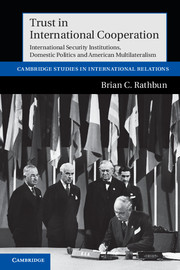 Trust in International Cooperation
Trust in International Cooperation Published online by Cambridge University Press: 05 June 2012
Rationalists have difficulty accounting for multilateral cooperation because of their reliance on strategic trust. However, rationalism does not exhaust the varieties of trust, either theoretically or empirically. Social psychologists have centered their attention instead on generalized trust, a relatively optimistic view about the trustworthiness of others. Generalized trust is not tailored to individual circumstances or partners but serves as a general rule that guides behavior and choices about cooperation. The etymology of generalized trust is “A trusts” or “A is trusting.” Generalized trust allows for a more open community and reciprocity circle.
Generalized trust is not based on a naïve belief that all others are trustworthy. Rather it is a default tendency to trust, ceteris paribus, unless there is specific information indicating that this is not wise (Mercer 2005: 95; Yamagishi 2001: 124). Brewer calls it “depersonalized trust” (1981: 356). As such, generalized trust is not inconsistent with distrust of specific others who have proved themselves to be unreliable and dishonest partners. As Uslaner writes, “It is hardly contradictory for someone who places great faith in people to check out the qualifications and honesty of specific persons” (2002: 24). Nor is it a panacea. Even generalized trust might not promote cooperation if the costs of a breach of trust are dramatic. Vulnerability is not distrust.
To save this book to your Kindle, first ensure [email protected] is added to your Approved Personal Document E-mail List under your Personal Document Settings on the Manage Your Content and Devices page of your Amazon account. Then enter the ‘name’ part of your Kindle email address below. Find out more about saving to your Kindle.
Note you can select to save to either the @free.kindle.com or @kindle.com variations. ‘@free.kindle.com’ emails are free but can only be saved to your device when it is connected to wi-fi. ‘@kindle.com’ emails can be delivered even when you are not connected to wi-fi, but note that service fees apply.
Find out more about the Kindle Personal Document Service.
To save content items to your account, please confirm that you agree to abide by our usage policies. If this is the first time you use this feature, you will be asked to authorise Cambridge Core to connect with your account. Find out more about saving content to Dropbox.
To save content items to your account, please confirm that you agree to abide by our usage policies. If this is the first time you use this feature, you will be asked to authorise Cambridge Core to connect with your account. Find out more about saving content to Google Drive.